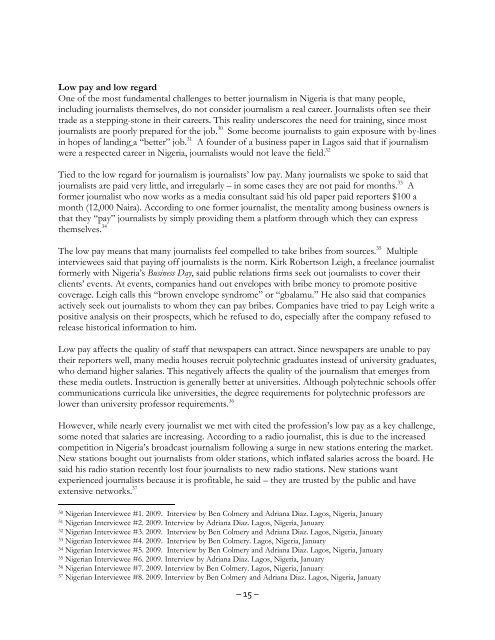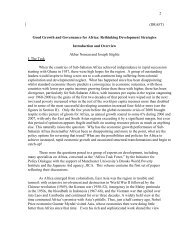THERE WILL BE INK - Initiative for Policy Dialogue
THERE WILL BE INK - Initiative for Policy Dialogue
THERE WILL BE INK - Initiative for Policy Dialogue
You also want an ePaper? Increase the reach of your titles
YUMPU automatically turns print PDFs into web optimized ePapers that Google loves.
Low pay and low regardOne of the most fundamental challenges to better journalism in Nigeria is that many people,including journalists themselves, do not consider journalism a real career. Journalists often see theirtrade as a stepping-stone in their careers. This reality underscores the need <strong>for</strong> training, since mostjournalists are poorly prepared <strong>for</strong> the job. 30 Some become journalists to gain exposure with by-linesin hopes of landing a “better” job. 31 A founder of a business paper in Lagos said that if journalismwere a respected career in Nigeria, journalists would not leave the field. 32Tied to the low regard <strong>for</strong> journalism is journalists’ low pay. Many journalists we spoke to said thatjournalists are paid very little, and irregularly – in some cases they are not paid <strong>for</strong> months. 33 A<strong>for</strong>mer journalist who now works as a media consultant said his old paper paid reporters $100 amonth (12,000 Naira). According to one <strong>for</strong>mer journalist, the mentality among business owners isthat they “pay” journalists by simply providing them a plat<strong>for</strong>m through which they can expressthemselves. 34The low pay means that many journalists feel compelled to take bribes from sources. 35 Multipleinterviewees said that paying off journalists is the norm. Kirk Robertson Leigh, a freelance journalist<strong>for</strong>merly with Nigeria’s Business Day, said public relations firms seek out journalists to cover theirclients’ events. At events, companies hand out envelopes with bribe money to promote positivecoverage. Leigh calls this “brown envelope syndrome” or “gbalamu.” He also said that companiesactively seek out journalists to whom they can pay bribes. Companies have tried to pay Leigh write apositive analysis on their prospects, which he refused to do, especially after the company refused torelease historical in<strong>for</strong>mation to him.Low pay affects the quality of staff that newspapers can attract. Since newspapers are unable to paytheir reporters well, many media houses recruit polytechnic graduates instead of university graduates,who demand higher salaries. This negatively affects the quality of the journalism that emerges fromthese media outlets. Instruction is generally better at universities. Although polytechnic schools offercommunications curricula like universities, the degree requirements <strong>for</strong> polytechnic professors arelower than university professor requirements. 36However, while nearly every journalist we met with cited the profession’s low pay as a key challenge,some noted that salaries are increasing. According to a radio journalist, this is due to the increasedcompetition in Nigeria’s broadcast journalism following a surge in new stations entering the market.New stations bought out journalists from older stations, which inflated salaries across the board. Hesaid his radio station recently lost four journalists to new radio stations. New stations wantexperienced journalists because it is profitable, he said – they are trusted by the public and haveextensive networks. 3730 Nigerian Interviewee #1. 2009. Interview by Ben Colmery and Adriana Diaz. Lagos, Nigeria, January31 Nigerian Interviewee #2. 2009. Interview by Adriana Diaz. Lagos, Nigeria, January32 Nigerian Interviewee #3. 2009. Interview by Ben Colmery and Adriana Diaz. Lagos, Nigeria, January33 Nigerian Interviewee #4. 2009. Interview by Ben Colmery. Lagos, Nigeria, January34 Nigerian Interviewee #5. 2009. Interview by Ben Colmery and Adriana Diaz. Lagos, Nigeria, January35 Nigerian Interviewee #6. 2009. Interview by Adriana Diaz. Lagos, Nigeria, January36 Nigerian Interviewee #7. 2009. Interview by Ben Colmery. Lagos, Nigeria, January37 Nigerian Interviewee #8. 2009. Interview by Ben Colmery and Adriana Diaz. Lagos, Nigeria, January– 15 –














